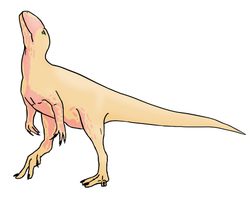Eocarcharia
| Eocarcharia Temporal range: Early Cretaceous, | |
|---|---|
 | |
| Skull restoration with holotype remains in yellow | |
| Scientific classification | |
| Domain: | Eukaryota |
| Kingdom: | Animalia |
| Phylum: | Chordata |
| Clade: | Dinosauria |
| Clade: | Saurischia |
| Clade: | Theropoda |
| Superfamily: | †Allosauroidea |
| Genus: | †Eocarcharia Sereno & Brusatte, 2008 |
| Type species | |
| †Eocarcharia dinops Sereno and Brusatte, 2008 | |

Eocarcharia (meaning "dawn shark") is a genus of allosauroid theropod dinosaur from the Early Cretaceous Elrhaz Formation that lived in the Sahara 112 million years ago, in what today is the country of Niger. It was discovered in 2000 on an expedition led by University of Chicago paleontologist Paul Sereno. The type and only species is Eocarcharia dinops.[1] Its teeth were shaped like blades and were used for disabling live prey and ripping apart body parts. Eocarcharia's brow is swollen into a massive band of bone, giving it a menacing glare[2] (leading to the specific name dinops or "fierce-eyed"). It may have reached lengths of 6–8 m (19.7–26.2 ft).[1]
Discovery
[edit]The type specimen MNN GAD2 consists of a maxilla, frontals and a prefrontal, teeth, as well as parietal and fragmentary left and right orbitosphenoids.[1][3] Eocarcharia was described alongside the abelisaurid Kryptops.[2] Some of the Kryptops remains were found to belong to a carcharodontosaurid. These remains may belong to Eocarcharia.[4]
Paleoecology
[edit]
In the Elrhaz Formation, dinosaurs that lived with Eocarcharia include theropods Kryptops palaios and Suchomimus tenerensis, sauropod Nigersaurus taqueti, and ornithopods Ouranosaurus nigeriensis, Lurdusaurus arenatus, and Elrhazosaurus nigeriensis.[1]
Classification
[edit]In their 2022 description of the giant carcharodontosaurid Meraxes, Canale et al. recovered Eocarcharia as an early member of the clade, in a polytomy with Concavenator, Lajasvenator and Lusovenator. The results of their phylogenetic analyses are displayed in the cladogram below:[5]
In his 2024 review of theropod relationships, Cau included both the Eocarcharia holotype skull roof, as well as the referred maxilla in a phylogenetic analysis. Both taxonomic units were not recovered in a monophyletic clade. His results are displayed in the cladogram below:[6]
| Carcharodontosauridae |
| |||||||||||||||||||||||||||||||||||||||||||||||||||||||||||||||||||||||||||
In the description of the carcharodontosaurid Tameryraptor, Cuesta and Rauhut (2025) recovered Eocarcharia in much more basal positions, either as the sister taxon of Carcharodontosauriformes or as a basal member of Metriacanthosauridae.[7]
References
[edit]- ^ a b c d Sereno, Paul C. and Brusatte, Stephen L. (2008). "Basal abelisaurid and carcharodontosaurid theropods from the Lower Cretaceous Elrhaz Formation of Niger" (PDF). Acta Palaeontologica Polonica. 53 (1): 15–46. doi:10.4202/app.2008.0102.
- ^ a b New Meat-eating Dinosaur Duo from Sahara Unveiled Newswise, Retrieved on 21 September 2008.
- ^ Sereno, Paul C. and Brusatte, Stephen L. (January 2008). "Basal Abelisaurid and Carcharodontosaurid Theropods from the Lower Cretaceous Elrhaz Formation of Niger". Acta Palaeontologica Polonica. 53 (1): 15–46. doi:10.4202/app.2008.0102. hdl:20.500.11820/5d55ed2e-52f2-4e4a-9ca1-fd1732f2f964. ISSN 0567-7920.
- ^ Carrano, Matthew T.; Benson, Roger B. J.; Sampson, Scott D. (June 2012). "The phylogeny of Tetanurae (Dinosauria: Theropoda)". Journal of Systematic Palaeontology. 10 (2): 211–300. Bibcode:2012JSPal..10..211C. doi:10.1080/14772019.2011.630927. ISSN 1477-2019.
- ^ Canale, Juan I.; Apesteguía, Sebastián; Gallina, Pablo A.; Mitchell, Jonathan; Smith, Nathan D.; Cullen, Thomas M.; Shinya, Akiko; Haluza, Alejandro; Gianechini, Federico A.; Makovicky, Peter J. (July 2022). "New giant carnivorous dinosaur reveals convergent evolutionary trends in theropod arm reduction". Current Biology. 32 (14): 3195–3202.e5. Bibcode:2022CBio...32E3195C. doi:10.1016/j.cub.2022.05.057. PMID 35803271. S2CID 250343124.
- ^ Cau, Andrea (2024). "A Unified Framework for Predatory Dinosaur Macroevolution" (PDF). Bollettino della Società Paleontologica Italiana. 63 (1): 1-19. doi:10.4435/BSPI.2024.08 (inactive 20 November 2024).
{{cite journal}}: CS1 maint: DOI inactive as of November 2024 (link) - ^ Kellermann, Maximilian; Cuesta, Elena; Rauhut, Oliver W. M. (14 January 2025). "Re-evaluation of the Bahariya Formation carcharodontosaurid (Dinosauria: Theropoda) and its implications for allosauroid phylogeny". PLOS One. 20 (1): e0311096. Bibcode:2025PLoSO..2011096K. doi:10.1371/journal.pone.0311096. ISSN 1932-6203. PMC 11731741. PMID 39808629.


 French
French Deutsch
Deutsch














